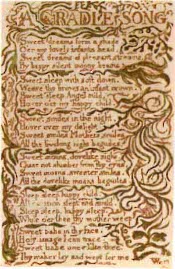Songs of Innocence and Experience Contents
- Social / political context
- Religious / philosophical context
- Literary context
- Textual history
- Songs of Innocence
- Introduction (I)
- The Shepherd
- The Ecchoing Green
- The Lamb
- The little black boy
- The Blossom
- The chimney sweeper (I)
- The little boy lost (I)
- The Little Boy Found
- Laughing song
- A Cradle Song
- The Divine Image
- Holy Thursday (I)
- Night
- Spring
- Nurse's Song (I)
- Infant Joy
- A Dream
- On Another's Sorrow
- Songs of Experience
- Introduction (E)
- Earth's Answer
- The Clod and the Pebble
- Holy Thursday (E)
- The Little Girl Lost
- The Little Girl Found
- The Chimney Sweeper (E)
- Nurse's Song (E)
- The Sick Rose
- The Fly
- The Angel
- The Tyger
- My Pretty Rose-tree
- Ah! Sun-flower
- The Lilly
- The Garden of Love
- The Little Vagabond
- London
- The Human Abstract
- Infant Sorrow
- A Poison Tree
- A Little Boy Lost (E)
- A Little Girl Lost
- To Tirzah
- The Schoolboy
- The Voice of the Ancient Bard
- A Divine Image
A Cradle Song - Synopsis and commentary
Synopsis of A Cradle Song

A mother croons a lullaby to her sleeping child. She asks that nothing disturb her baby's sleep. She then asks for sleep for the child while she weeps for him. She goes on to think of the child as an image of Jesus, who became a child and wept for all creation. The child is fresh from God and so still sees Jesus' face, smiling at him and on all. A baby's smiles are Christ's smiles and they make peace between heaven and earth.
This poem explores the theme of parental care. It also considers the relationship between the human perspective of God and the way in which people approach, or avoid, the co-existence of ‘joy and woe' in human life.
Commentary
The mother wants to keep her child totally innocent with no experience of ‘woe' (See Religious / philosophical background > Philosophical influences on Blake > Blake and Jacob Boehme) Even the ‘dovelike moans' must be calmed. Yet the mother can't ignore that there is cause for sorrow in life. She seems to weep over what the child must face, which she longs to keep at bay. This recognition leads her to thoughts of Jesus who came to share that experience of human sorrow.
However, the mother moves on from that awareness of grief by comforting herself that the baby is fresh from God and, therefore, is still able to see him. Jesus smiles on her baby just as she does. He is an innocent, smiling child, who charms heaven and earth into peace. This seems to allow her to forget her reason for weeping. The thought of Jesus as a persecuted and suffering human is set to one side.
This poem seems to be almost an illustration of lines from another Blake poem, Auguries of Innocence:
Man was made for joy and woe,
And when this we rightly know,
Thro' the world we safely go.
While the mother implicitly recognises this, she also shies away from it. Her desire to protect her baby, however, will not serve his ultimate protection. It is awareness of the co-existence of the two which will safeguard him, not the preservation of ignorant innocence.
Investigating A Cradle Song
- Create a list of words which describe the picture Blake gives you:
- Of motherhood
- Of God / Christ
